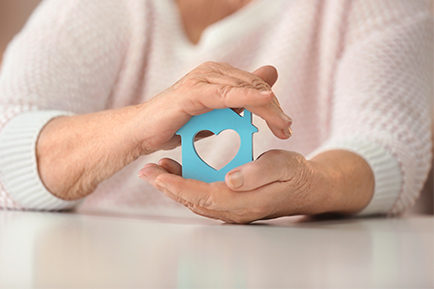Every year, millions of older adults are injured in their homes, with common injuries including burns, poisoning and falls. Accidental falls are the biggest culprit, accounting for nearly 3 million emergency room visits every year, and most of those are for serious injuries.
In the midst of the COVID-19 crisis, with so many of us isolated in our homes, this safety concern has never been more important. If you’re a senior living alone, or if you have aging parents still in their home, adapting the residence into a safe environment for day-to-day living could literally be a life-saver. Many of the changes needed are quick, simple, and you can do them yourself. Others are more involved and costly, but all are important to put in place.
Take a look around your home using the home safety tips for seniors below. This will give you a good idea of what hazards to look for and fixes you can make to create a senior-friendly household.
Stairs
When it comes to home safety for seniors, stairways present a high fall risk. While a fall on a flat surface can cause injury, falling down a flight of stairs can create an even more serious situation. To make stairs safer:
- Be sure the stairway is well lit from top to bottom; replace lightbulbs as soon as they burn out.
- Install handrails on both sides of the stairs, and make sure they’re sturdy and tightened properly.
- Make sure carpeting isn’t torn and it’s firmly attached to every stair.
- If stairs are uncarpeted, apply nonslip rubber treads or contrasting tape.
- Never use the stairs to store items to take up or down later, such as shoes, clothing, books or papers.
Living Areas
- To prevent falls, arrange furniture to create clear pathways that reduce the risk of tripping and falling.
- Clear floors of clutter such as shoes, boxes, blankets, magazines or other objects you could easily trip over.
- Remove throw rugs, or secure them to the floor with double-sided tape or a nonslip backing.
- For wood or tile floors, use a nonslip wax.
- Make sure electrical and telephone cords aren’t running loose across pathways. Coil or tape them next to the wall so you can’t trip over them.
- Remove or minimize thresholds that transition between rooms or types of flooring, such as between carpet and wood floors.
- Replace doorknobs and ball-style faucet handles with lever handles that are easier to manage, especially for arthritic hands.
- Make sure doorways are wide enough to accommodate a walker or wheelchair.
- Make sure smoke detectors are working properly. Test and change the batteries twice a year.
- Consider a medical alert system you can wear and use to alert family members or 911 if you fall or need emergency medical assistance.
Bedrooms
The above living area home safety tips for seniors also apply to bedrooms. Other bedroom tips include:
- Have a sturdy bedside table with a tip-proof lamp that’s easy to reach.
- To make getting dressed easier, place a comfortable chair near the closet or bureau.
- Install night lights that turn on and off automatically.
Bathrooms
Many older adults slip and fall in the bathroom. To prevent falls and other potential hazards:
- Put a nonslip rubber mat or self-stick strips on the floor of the tub or shower.
- Install home safety equipment and safety devices such as grab bars near the toilet and in the shower.
- Set the water heater thermostat no higher than 120° F to prevent scalding.
- Make sure bath mats have a rubber backing.
- Place a waterproof chair in the shower.
- Replace the standard toilet with a high-profile toilet.
- Modify the shower for easy walk-in rather than step-over entry.
Kitchen
The kitchen can’t be overlooked when considering home safety for seniors.
- Clean up spills immediately.
- Keep things you use daily at arm’s reach or on the lower shelves about waist-high.
- Never stand on a chair to reach high shelves. Use a sturdy step stool with a handrail.
- Buy a handy grabber tool to help you grab things out of reach.
- Push chairs and stools under the counter or table to prevent tripping.
- While cooking, avoid wearing loose sleeves that can easily catch fire.
- Keep appliances in good working order, and replace any with frayed or damaged electrical cords.
Lighting
Be sure to add adequate lighting to your home safety checklist for seniors.
- Improve lighting by using brighter lightbulbs, at least 60 watts.
- Use lampshades or frosted bulbs to reduce glare.
- Add night lights with sensors in bathrooms, bedrooms, hallways and kitchen.
- Install luminescent light switches that glow in the dark.
Poison Prevention
- Place carbon monoxide detectors near all bedrooms, and test and replace the batteries twice a year.
- Ask your pharmacist to put large-print labels on your medications to make them easier to read.
- To keep from mixing medications, keep them in their original containers.
- Never mix bleach, ammonia, or other cleaning liquids. When mixed, cleaning liquids can create deadly gases.
- Consider switching to green cleaning products, which are nontoxic and nonflammable.
Emergency Phone Numbers
Keep a list of emergency numbers near each phone. Make sure they’re easy to read in case you’re in a hurry or frightened. Be sure to list numbers for:
- 911
- Poison Control: 1-800-222-1222
- Family members or friends to call in case of emergency
- Your primary health care provider’s office
Don’t Overlook Your Health
Along with your environment, you also need to consider your physical health. If you have a chronic condition or other health issues, have had an injury, or are recovering from surgery, McLean offers award-winning Home Care. Serving Hartford County, Connecticut, and surrounding areas, McLean helps seniors maintain their health and well-being, all in the comfort of their home. To learn more about a Home Safety Evaluation, call McLean Outpatient Therapy at 860-658-3745.


